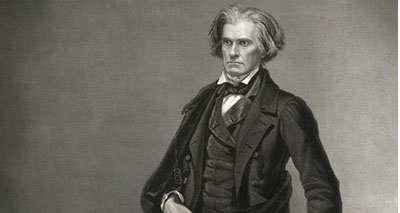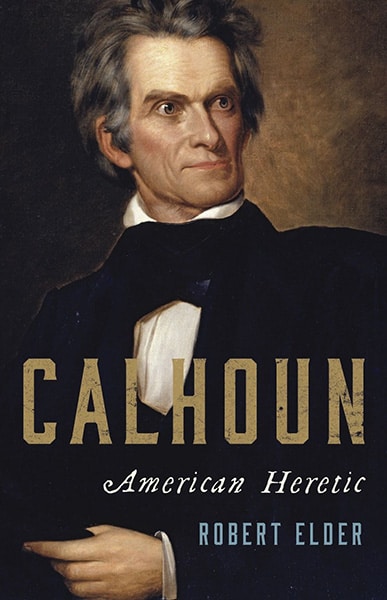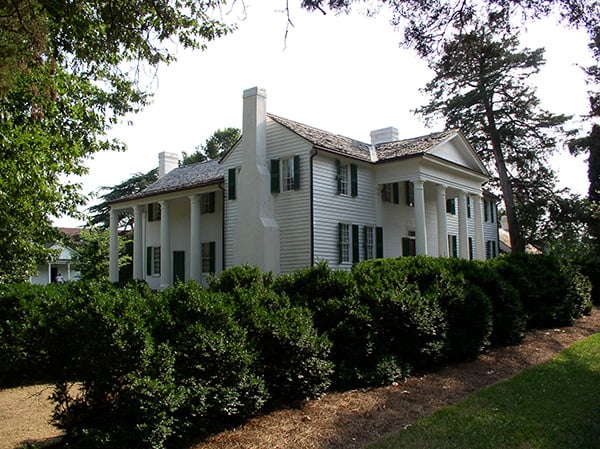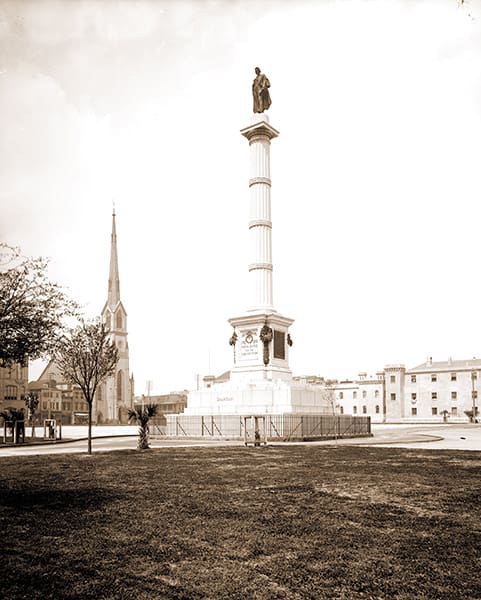America’s Greatest Political Thinker Since the Founders
Gregory Hood, American Renaissance, July 15, 2022

Credit Image: © Mary Evans via ZUMA Press
Robert Elder, Calhoun: American Heretic, Basic Books, 2021; 656 pp., $19.79 hardcover, $19.69 kindle, 656 pp.
Robert Elder’s biography, Calhoun: American Heretic, is an unintentional study in national decline. It’s crushing to lift one’s eyes from pages about Henry Clay, Daniel Webster, John Quincy Adams, John Randolph, John Taylor of Caroline, and the great Calhoun himself, to flickering images of Joseph Biden, Alexandria Ocasio-Cortez, and Ibram Kendi. This book explains some of the reasons for our decline.
Calhoun lived at a time when men took the law, the Constitution, republicanism, and honor seriously. “The duties of life are more than life,” was Calhoun’s mantra, according to Professor Elder, (page 50) who gives us a striking image of a young Calhoun studying the cyclical nature of history, reading about virtuous republics declining into decadent empires. From an early age, he understood the risks.

Professor Elder shows that Calhoun’s thought is modern and relevant, especially on the problem of protecting significant minorities within a large republic. He notes that Lani Guinier, the first tenured non-white woman at Harvard Law School, considered the same problem in Tyranny of the Majority: Fundamental Fairness in Representative Democracy. (540) With whites on their way to becoming a despised minority in the country they built, Calhoun’s theories have new relevance. He sets out a path for peaceful coexistence when there is little common ground. Ireland took that path.
Calhoun’s genius was to cut through the muddled language and (sometimes) deliberate incoherence politicians use to hide their real views. He thought out the logical consequences of constitutional, legal, and historical arguments. For this reason, abolitionist William Lloyd Garrison admitted that Calhoun was “incomparably to be preferred to those Northern time-servers and dough faces, who professedly look upon Slavery with abhorrence, and yet are found ever ready to compromise.” (504)
Four of Calhoun’s ideas are especially relevant today. The first is that patriotism doesn’t spring from high ideals, but from citizens and the state having a mutual stake in each other’s success. In a break from the traditional Democratic Republican suspicion of central government, the young nationalist Calhoun supported the War of 1812. Especially outraged by British impressment of American sailors — little better than kidnapping — Calhoun wrote:
I only know of one principle to make a nation great, and that is, to protect every citizen in the lawful pursuit of his business. He will then feel that he is backed by the government, that its arm is his arms, and will rejoice in its increased strength and prosperity. Protection and patriotism are reciprocal. This is the road that all great nations have trod. (94)
While conservatives might think these are platitudes, Calhoun’s rationale is modern. Conservatives and traditionalists who believe their institutions are divinely sanctioned or morally unimpeachable can be blind to the interests that actually support them. “Interest has a wonderful control over sentiment,” said Calhoun. “Even the more refined and elevated, the moral and religious sentiment may be considered as ultimately resting on it.”
Professor Elder says this statement would have shocked “republicans of the eighteenth century” but that’s why it’s important. Today’s subversives easily deconstruct Western institutions because too many conservatives think God or some great awakening will save those institutions. Calhoun’s eyes were clear. He’s part of the Machiavellian tradition, along with James Burnham and Sam Francis. He seems especially prescient when we see our current rulers selectively enforce the law and fail to protect property. Many whites think they don’t have a stake in the system and will benefit if it collapses. If the state treated them fairly, they wouldn’t feel that way.
Statesmanship reinforces the symbiosis between citizens and the state. The Republic is preserved when property holders and citizens trust the government. In Professor Elder’s words, Calhoun and others who supported the War of 1812 were incensed because “to be an American citizen was, by definition, to not be a slave.” Thus, “Calhoun and the war Republicans frequently portrayed impressment as a kind of enslavement that subjected free, white American citizens to the kind of shame endured by black slaves.” (99)
Calhoun’s doctrine does not serve everyone. Richard Hofstadter had reason to call him the “Marx of the master class.” Progressives would say his views bias the state in favor of property holders and current citizens. It means that non-citizens, those outside the state (Indian tribes), and those not represented by the system have no stake in the Republic. In Calhoun’s time, it also meant that the United States defended slaveholders and their property, putting slaves and even abolitionists outside the polity. (We should remember that Virginia executed John Brown for treason against the Commonwealth, not just for murder.)
This is all true. Professor Elder repeatedly notes that Calhoun took for granted that the expansion of American civilization meant displacing Indian tribes, and saw no contradiction between this and republicanism.
Calhoun even argued that common sacrifices, such as conscription, may be necessary to defend freedom. Freedom, he said, “requires efforts” and “presupposes mental and moral qualities of a high order.” Government derives what Calhoun called its “moral power” from the mutual interests of the state and citizens.
Calhoun’s second main argument is that America’s racially discriminatory policies, including slavery, unify white citizens, protect democracy, and mitigate class differences. “Calhoun held a lifelong belief in the wisdom of the people, properly consulted, so there is no reason to believe he was not sincerely committed to broadening the reach of democracy as he understood it,“ writes Professor Elder, “but as the future would show, Calhoun also understood that a common economic and political interest in slavery made a broad commitment to white democracy possible in South Carolina.” (75)
Calhoun thought slavery was so interwoven with American and especially Southern institutions that destroying it would, in his words, “destroy us as a people.” (337) He also understood a defensive stance in politics is always doomed. Thus, he defended slavery as a “positive good,” and called some inequality inevitable and desirable. “There never has yet existed a wealthy and civilized society in which one portion of the community did not, in point of fact, live on the labor of the other,” he said. In what Professor Elder calls a “brilliant rhetorical move,” Calhoun said slavery better provided for the elderly and infirm than ruthless capitalism.
This was brilliant because it was true. Antebellum workers’ tracts poured contempt on “men who stand and dole out pity for the southern slave but would crush with an iron hand the white laborer of the north.” One paper mocked the abolitionist pose of upper-class northern women: “Their tender hearts were sighing/As the negro’s wrongs were told/While the white slave was dying/Who gained their fathers’ gold.”[1]
Calhoun argued that slavery also promoted social peace and served white workers’ interests. “There is and always has been in an advanced stage of wealth and civilization, a conflict between labor and capital,” he wrote in 1837. “The condition of society in the South exempts us from the disorders and dangers resulting from this conflict; and which explains why it is that the political condition of the slaveholding States has been so much more stable and quiet than that of the North.” (339) Calhoun was writing at a time of major labor disorders in Northern cities and his message appealed “to the rank and file members of New York’s labor movement” and to workers furious about the “slavery of wages.” (404) In response to the slogan “no one is free unless all are free,” Calhoun might respond that no one has ever been free unless others were subjugated.
Calhoun offered a solution to the problem of class conflict by proposing almost deliberately engineered racial conflict, but there is one glaring flaw with Calhoun’s vision of the “stable and quiet” South: the danger of slave revolts. Even this becomes a kind of advantage, however — something democratic, because the ruling class must expand the vote to poor whites and let them serve in the military. Professor Elder says Calhoun “clearly viewed the peculiar institution as a cornerstone of the American system of government, a felicitous ingredient in the historical happenstance that produced American freedom.” (503) This made American republicanism superior and more progressive than the European monarchies. Slavery promoted republicanism by giving poor whites a stake in the system, rich whites a reason to care about poor whites, and both a reason to defend the government.
Calhoun’s third argument also derives from his racial views. He opposed admitting non-whites as citizens of the Union and the pursuit of empire. He generally supported South American independence movements. He favored Texas annexation but initially opposed the Mexican War. (474) He wanted to “inflict the least possible amount of injury on Mexico” and called for America to be “liberal and just to her.” He wrote against annexing the whole country. “Are we to associate with ourselves, as equals, companions and fellow-citizens, the Indian and mixed races of Mexico?” he asked. “I would consider such association as degrading ourselves and fatal to our institution.” Professor Elder says such opinions are “shocking” today, but admits Calhoun was “far more attuned to the mainstream of white public opinion on this than he was in his defense of slavery.”
Professor Elder writes:
He [Calhoun] could support taking Oregon, California, and New Mexico on the assumption that they would one day be filled with white people, and thus could be incorporated into the United States, even if they might be free states. But the United States could not conquer and incorporate a nation of nonwhite people without destroying its form of government, and it could not safely hold them as a province or possession because to do so was antithetical to the genius and character of that government. (473)
Let America’s current disorder and its record of trying to spread democracy in the Third World testify to whether Calhoun was right.
Professor Elder even writes that Calhoun’s “belief that the American system of government would be destroyed by an imperial project that would necessarily hand unprecedented power and patronage to the federal government, particularly the executive branch, is a salutary warning in our own era of endless foreign wars.” Professor Elder also credits Calhoun for noting that a taste for “subjugating neighboring nations” ultimately leads to citizens losing their freedom at home, a freedom that requires constant effort to preserve. Obviously, Calhoun didn’t forget his early reading about the collapse of republics into decadent empires.
Finally, Calhoun’s most consequential ideal is that of the concurrent majority. This, presented in A Disquisition on Government and in a Discourse on the Constitution and Government of the United States, is probably the most significant American contribution to serious political science since The Federalist.
Calhoun argued, correctly, that the Founders failed to anticipate the rise of parties and inadvertently created a machine that would let a numerical majority oppress a minority. Idealistic rhetoric about democracy is no protection. “Power can only be resisted by power, — and tendency by tendency,” Calhoun wrote in the Disquisition, sweeping aside dreamers who think the Constitution solved all our problems. Thus, the need for a “concurrent majority.” He worried about the need to consider each “interest of a portion of the community, which may be unequally and injuriously affected by the action of the government.” The nation needed “some other way by which its voice may be fairly expressed . . . [that would] require the consent of each interest, either to put or to keep the government in action.” (page 14 of the Disquisition)

Fort Hill, home of John C. Calhoun and later Thomas Green Clemson. Photo credit: blahedo, CC BY-SA 2.5, via Wikimedia Commons
Calhoun also argued for the “compact” theory of America’s founding, arguing that the states had created the union. The federal government isn’t even a truly “national” government:
In all its parts, — including the federal as well as the separate State governments, it emanated from the same source, — the people of the several States. The whole, taken together, form a federal community; — a community composed of States united by a political compact; — and not a nation composed of individuals united by, what is called, a social compact.
The “concurrent majority” that would protect all sections from being oppressed by a nominal majority, would protect that compact. Drawing on the precedent of Sparta and republican Rome, Calhoun proposed a dual executive that would watch over the interests of the weaker South:
And thus, the presidential election, instead of dividing the Union into hostile geographical parties, the stronger struggling to enlarge its powers, and the weaker to defend its rights, — as is now the case, — would become the means of restoring harmony and concord to the country and the government. It would make the Union a union in truth, — a bond of mutual affection and brotherhood; — and not a mere connection used by the stronger as the instrument of dominion and aggrandizement, — and submitted to by the weaker only from the lingering remains of former attachment, and the fading hope of being able to restore the government to what it was originally intended to be, a blessing to all.
Some white advocates, especially those who emerged from conservatism, may seek to find a solution to our problems in states’ rights and federalism. However, Calhoun’s “concurrent majority” theory, even if we reject his idea of a dual executive, may be more relevant to our times. State and even sectional boundaries are less important to political coalitions than races and ethnic groups. References to “our communities” are now standard in public statements and politicians’ platitudes. Read America’s own official propaganda for proof that America is a coalition of tribes rather than a nation or even Calhoun’s union of states.
The question is where whites fit in. Whites, and whites alone, exist objectively but not subjectively, with anti-white hostility holding together the progressive coalition. For now, most whites lack racial consciousness, but there’s evidence they increasingly see themselves as victims of official discrimination. Whether or not whites see themselves as white, everyone else does, and in an age when being “colorblind” has become racist, white consciousness is inevitable. It will gain strength as whites become a minority, and the doublespeak about the Great Replacement will encourage it.
If whites become a racially conscious minority, it will be impossible to maintain the union without Calhoun’s concept of the “concurrent majority.” Professor Elder notes that when Calhoun “proclaimed the United States, not the Confederacy, ‘the government of the white man,’ it was possibly one of the least controversial things that he ever said.” [emphasis added] (546) The whites who built the land that non-whites hope to dominate therefore deserve a collective voice and a veto. Today, the United States is becoming a government of everyone against the white man. That transformation will not be without conflict.
Calhoun was not perfect. Unlike men such as James Madison, Henry Clay, and even Abraham Lincoln, he did not support the American Colonization Society. Nor did he appear to consider the Free Soil Party’s case for restricting slavery and protecting white workers. Instead, he took for granted that slavery was crucial for the South, and that defending and even championing it was necessary for its survival. Of course, whites would have been much better off without slaves, and anything slavery may have produced was lost in the Civil War and in the centuries-long depredations of blacks that followed.
Still, many of the issues Calhoun discussed may be returning. The federal regime expects our loyalty without offering security, let alone protecting liberty. At home and abroad, it tries to make non-whites fit white standards, and its “experts” then express bafflement when plans fail, from Atlanta to Afghanistan. “Americans” lack a racial, cultural, or even linguistic identity. Not surprisingly, most Americans believe their government — our supposedly sacred democracy — does not work.

Calhoun Monument, Marion Square, Charleston, S.C, 1890. Credit: Album / quintlox
Calhoun warned Americans that “[liberty] is a reward to be earned, not a blessing to be gratuitously lavished on all alike — a reward for the intelligent, the patriotic, the virtuous and deserving — and not a boon to be bestowed on a people too ignorant, degraded and vicious, to be capable either of appreciating or enjoying it.” What better epitaph could there be for our repeated disasters, domestic and foreign.
Calhoun’s critiques are therefore relevant in an age of multiculturalism, and show what a political voice for white Americans might look like under this system. If we don’t get a voice, and the Union cannot be preserved, Calhoun’s teachings will be important in building the country or countries that come next.
* * *
[1] Quoted in Anne Norton, Alternative Americas, University of Chicago Press, 1986, p. 238.















